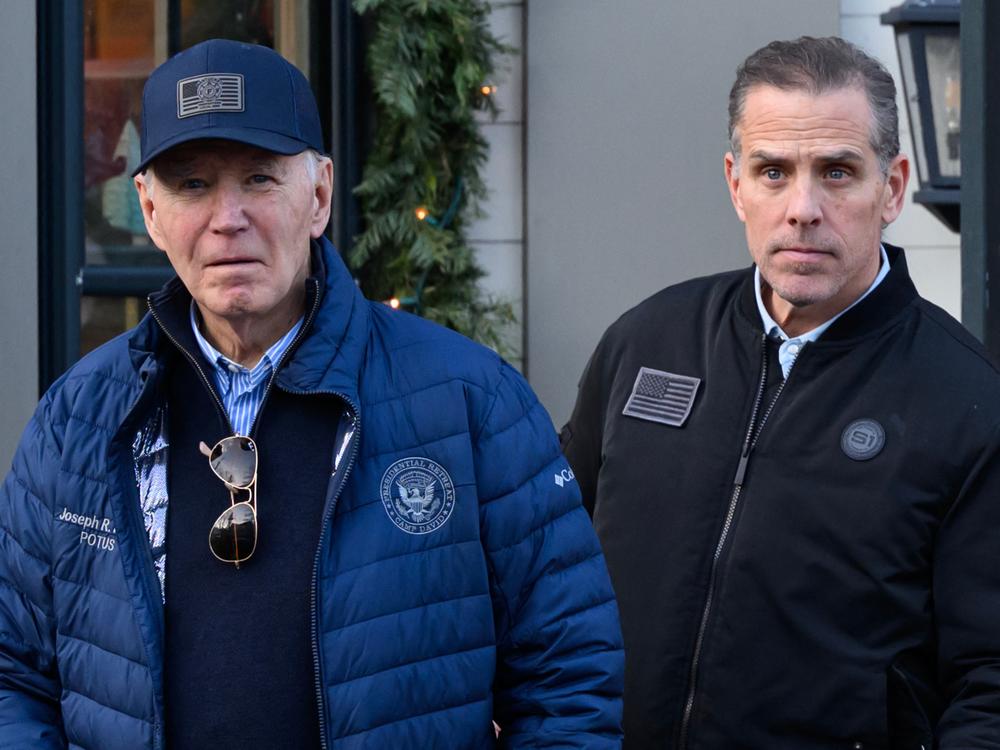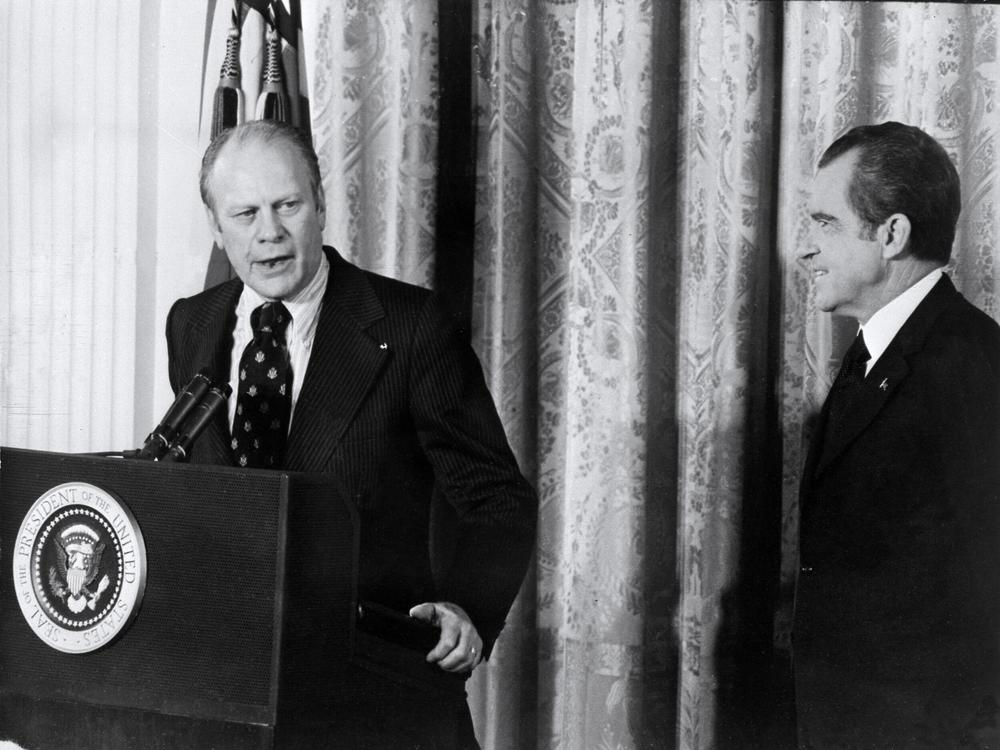Section Branding
Header Content
Biden isn't the first president to pardon a relative. Here's how the power works
Primary Content
The topic of presidential pardons is back in the spotlight this week after President Biden announced he signed a "full and unconditional" one for his son.
Hunter Biden was convicted earlier this year of federal gun charges for lying about his addiction to crack cocaine when he purchased a gun, and separately pleaded guilty to tax offenses for failing to pay at least $1.4 million in federal taxes. Sentences in both cases were scheduled to be handed down later this month.
The president has said publicly that he would not pardon his son — but reversed that promise in an announcement on Sunday in which he called the prosecution unfair and selective.
Biden blamed his opponents in Congress for instigating the charges against Hunter and unraveling his would-be plea deal through political pressure, though the special counsel leading the firearm probe has denied facing political interference.
In his statement, Biden said, "No reasonable person who looks at the facts of Hunter's cases can reach any other conclusion than Hunter was singled out only because he is my son."
"I believe in the justice system, but as I have wrestled with this, I also believe raw politics has infected this process and it led to a miscarriage of justice," Biden added. "I hope Americans will understand why a father and a President would come to this decision."
Biden's decision was met with criticism from both sides of the aisle.
For one, his rationale closely echoes Donald Trump's claims of a politicized Justice Department — even though the charges against Hunter Biden and Trump, the first president to be convicted of a felony, are very different. Trump was charged with trying to overturn the 2020 election and endangering national security through his handling of classified documents, though both cases were dismissed after his 2024 election victory.
Trump was quick to slam Biden's pardon as an "abuse and miscarriage of Justice." Even some Democrats — including Colorado Gov. Jared Polis, Arizona Rep. Greg Stanton and Colorado Sen. Michael Bennet— publicly denounced Biden's decision. They warned it could set a dangerous precedent, especially before the return of Trump, who has vowed to pardon Jan. 6 rioters and baselessly suggested he could even pardon himself.
"Joe Biden put self before country, and just pardoned his son," tweeted Joe Walsh, an anti-Trump former Republican congressman who had endorsed Biden. "And that selfishness took the 'no one is above the law' argument against Trump off the table."
Presidential pardons have been commonplace since the days of George Washington, who forgave the two men convicted of treason for their role in the Whiskey Rebellion. Over the years, many have been cause for celebration as well as controversy.
What is a pardon?
Presidential pardon authority is inspired by early English law, which granted kings "the prerogative of mercy."
Article II, Section 2 of the Constitution gives the president the power to "grant Reprieves and Pardons for Offences against the United States, except in Cases of Impeachment."
"The U.S. Constitution grants the president of the United States what's called unilateral clemency power," explains Lauren-Brooke Eisen, the senior director of the Brennan Center's Justice Program. "And you can think of clemency as the umbrella term."
Acts of clemency include granting amnesty, reprieves, commutations, and pardons — the most expansive form of relief.
A full pardon releases the person from punishment and restores their civil liberties, including their right to vote, hold office and sit on a jury.
"Clemency really is an expression of mercy, and often tempers the very overly punitive, harsh, inequitable results that our criminal justice system produces," says Eisen.
The Supreme Court has repeatedly recognized the president's pardoning powers as relatively broad, "extending to 'every offence known to the law' and available 'at any time after [a crime's] commission, either before legal proceedings are taken or during their pendency, or after conviction and judgment,' " according to the Congressional Research Service (CRS).
In some rare cases, presidents have even pardoned individuals who had not been charged with a crime: Gerald Ford pardoned Richard Nixon after the Watergate scandal, and Jimmy Carter pardoned most Vietnam War draft dodgers, both charged and uncharged.
The only limits — at least according to the Constitution — are that a president can only grant pardons for federal criminal offenses, not state or civil offenses, and cannot issue pardons in cases of impeachment.
How have pardons typically been used?
Presidents have pardoned all sorts of federal offenses, from marijuana possession to mail fraud to murder. Somewhere along the way, they even started pardoning Thanksgiving turkeys to spare them from the dinner table.
Some pardons have involved high-profile figures: Andrew Johnson pardoned a doctor who treated John Wilkes Booth's broken leg after he assassinated Abraham Lincoln, as well as thousands of Confederate soldiers and officials after the Civil War.
Warren Harding pardoned Socialist Party leader Eugene Debs after he was sentenced to a decade in prison for speaking out against World War I. Richard Nixon pardoned Teamsters leader Jimmy Hoffa during his 15-year prison sentence for jury tampering and fraud.
More recently, over 3,000 acts of clemency were granted in the four decades between the start of the Ronald Reagan and end of the Barack Obama administrations, according to the White House Historical Association.
But the number of pardons has varied widely between presidents.
Obama granted the most clemency actions — 1,927, of which 212 were pardons — of two-term presidents since the mid-20th century, according to the Pew Research Center. George W. Bush issued the fewest — 200, including 189 pardons.
Trump granted 237 acts of clemency during his first term, including 143 pardons and 94 commutations. His use of the power was relatively rare compared to many of his predecessors, but highly controversial because most of the people he helped had some sort of personal or political connection to him.
Have presidents pardoned relatives before?
Biden is now the third president to pardon a relative.
On his last day in office in 2001, President Bill Clinton pardoned his half-brother, Roger, who had pleaded guilty and spent a year in jail on drug charges.
That was one of a whopping 140 pardons that Clinton issued that day, and not the most controversial.
He got much more flack for pardoning Marc Rich, a disgraced financier who had fled to Switzerland after being indicted for evading more than $48 million in taxes, among other charges. Rich's ex-wife Denise had donated over $1 million to Democrats and Clinton's presidential library, raising questions and a Justice Department investigation into the pardon, which ultimately found no wrongdoing by Clinton.
Trump also issued a flurry of pardons — 74, to be exact — in the final hours of his first term, with recipients including his former chief strategist Steve Bannon, rapper Lil Wayne and Al Pirro, the former husband of Fox News commentator Jeanine Pirro.
He had previously pardoned many other members of his inner circle who had been charged with various crimes, including Republican operative Roger Stone, former campaign chairman Paul Manafort and Charles Kushner — the father of his senior advisor, and son-in-law, Jared Kushner.
Charles Kushner, himself a real estate billionaire, pleaded guilty in 2004 to filing false tax returns, lying to the Federal Election Commission and retaliating against a witness: his own brother-in-law.
The case, prosecuted by then-U.S. Attorney Chris Christie, led to Kushner attempting an elaborate blackmail plot against his brother-in-law and former employee, William Schulder, who had become a witness for federal prosecutors. He hired a prostitute to sleep with Schulder, secretly videotaped the encounter and mailed the recording to Schulder's wife — his own sister — who turned it over to authorities.
Kushner served about two years in prison before his release in 2006, and Trump cited his philanthropic record "of reform and charity" when pardoning him in 2020. Over the weekend, Trump announced he intends to nominate Charles Kushner to serve as ambassador to France.
How does Hunter's pardon fit into Biden's clemency record?
Biden has pardoned 25 individuals and commuted 132 sentences during his tenure, according to Justice Department data. He has granted clemency to many more, including entire groups.
In 2022, he took executive action to pardon the more than 6,500 people convicted of simple marijuana possession under federal law and D.C. statute, which he expanded last year. Earlier this year, he issued a blanket pardon to LGBTQ+ service members removed from the military over their sexual orientation or gender identity.
Even so, Eisen says there is much more Biden could do before his term ends — including addressing the more than 8,000 petitions for clemency pending before his administration.
The Brennan Center, which describes itself as a nonpartisan law and policy organization, is among the groups urging the president to commute all death sentences to life without parole.
Last month, more than 60 members of Congress wrote Biden a letter asking him to use his authority to "help broad classes of people and cases, including the elderly and chronically ill, those on death row, people with unjustified sentencing disparities, and women who were punished for defending themselves against their abusers."
While Biden's most recent — and most personal — pardon is in the spotlight, Eisen hopes he will take this opportunity to afford the same grace to many others who are already serving what she calls excessive sentences.
"President Biden has until January 20 to provide clemency for thousands of individuals who are appropriate clemency candidates who are sitting in federal prison right now," Eisen says. "So there's plenty of time."


